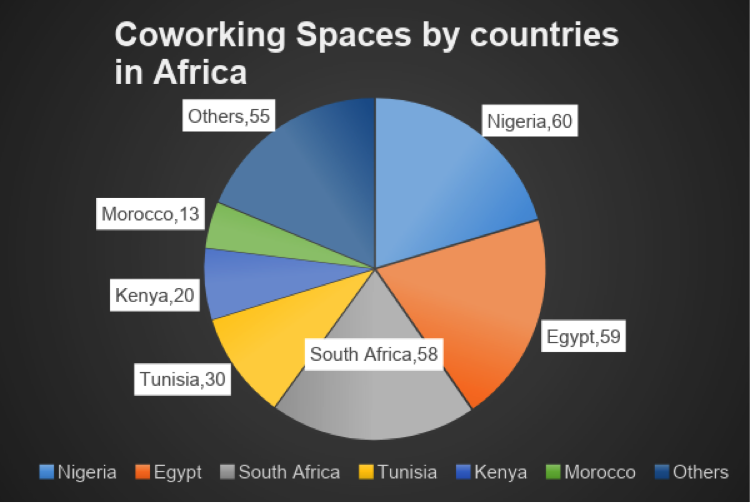
Trends of co-working space in Africa
The number of co-working spaces in Africa is increasing.
As of 2013, there were only 24 co-working spaces in Africa, but now there are 295 places.
This clearly shows that Africa has many startups contributing to economic development.
Looking at the number of co-working spaces by country, three countries stand out specifically – Nigeria, Egypt and South Africa.
They are then followed by Tunisia, Kenya and Morocco.

Of course, like developed nations, there are some typical reasons such as “We want to save the expense of renting or buying an office” or “We want an environment where we can complete with other entrepreneurs”.But that’s not all.
In Africa, especially in areas where the infrastructure is not in place, there is a high need for a “secure reliable supply of electricity and securing of the communication environment”.So we’d like to look at the cases of co-working space in South Africa, Nigeria and Kenya.※※※※※※※※※※※※
Cape town office / South Africa


It was introduced in Forbes magazine’s “The World’s Best 10 Co-working Spaces”.
The site is 600 square meters, with 90 desks and 3 meeting rooms inside.
In this facility, there are various usage plans.
An unlimited usage plan of about 2,800 ZAR (approx. $210) per month, plus a plan of about 1,100 ZAR (approx. $82) for 50 hours a month, etc.The network environment is also good.
200 Mbps communication speed is guaranteed in this co-working space.
Such communication speeds are secured in many other co-working spaces in Africa as well.
When considering the use of a co-working space in Africa, it is desirable to check the communication environment in advance.※※※※※※※※※※※※
Hub30 / Nigeria

Furthermore, there’s a one-day plan where one is charged for only one day of usage.
There are some low price plans such as “₦15,000 (approx. $40) monthly plan” and “₦1,000 (approx. $3) one day plan”.
Open collaborative working space and private spaces for individual work are secured, and free Wi-Fi, a constant power supply, and printing service are also included.It’s one of the new co-working spaces so it might be a good example showing Africa’s co-working space business development.
iHub / Kenya


It is a space that started in 2010.
They relocated in 2017 and have doubled in size from their previous location.
The new space features restaurants and grocery stores.

From the fact that Google, Microsoft, IBM and others are big partners, it can be said that the service performance and the credibility of iHub seem high.The founder of iHub, Erik Hersman is a person who has been leading the Tech industry in Africa.

He is also the founder of “BRCK”, a company that manages Wi-Fi spots with outstanding features such as waterproofing and solar power generation.※※※※※※※※※※※※As you can see from the three co-working spaces, there’s no big difference in terms of quality even compared to those of developed countries.On the other hand, from the perspective of users of these spaces, and number of problems have been raised.
“Sometimes events are held in the shared space, so you cannot use it at that time”
This seems to be a similar problem to co-working spaces in Japan and other developed countries.
“There are many co-working spaces in the center of the city, so traffic jams are serious”
This is unique to Africa, but it’s difficult to resolve without the cooperation of co-working space management.
※※※※※※※※※※※※
Co-working spaces from now on
In 2017, the number of newly established startups increased by 37% from the previous year.
Therefore, the demand for co-working spaces for startups is expected to rise steadily.
Meanwhile, in parallel with the demand for co-working spaces, the demand for offices is rapidly rising.
In other words, the scale of startups in Africa has been expanding, and it is maturing into an environment with more employees.
Following the trend of increasing operation of co-working spaces, the number of office sharing management companies can also be expected to increase.
In addition, the potential for involvement of the real estate industry, which is a peripheral industry, has also expanded.
※※※※※※※※※※※※
In this way, co-working spaces in Africa have a quality that is no different from that in the rest of the world.
So, if you have a business in Africa, using a co-working space is absolutely an option to consider.
Working in a secure environment and interacting with local entrepreneurs, you should have many opportunities to advance your business.



